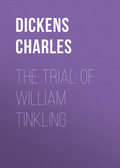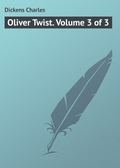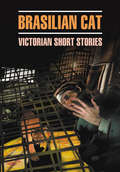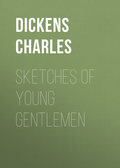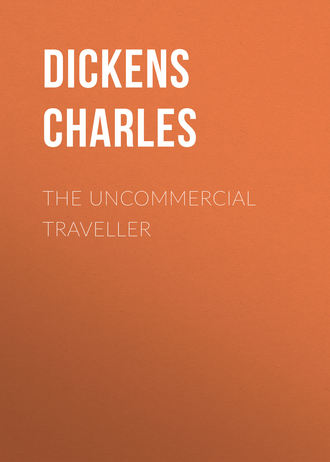
Чарльз Диккенс
The Uncommercial Traveller
X
SHY NEIGHBOURHOODS
So much of my travelling is done on foot, that if I cherished betting propensities, I should probably be found registered in sporting newspapers under some such title as the Elastic Novice, challenging all eleven stone mankind to competition in walking. My last special feat was turning out of bed at two, after a hard day, pedestrian and otherwise, and walking thirty miles into the country to breakfast. The road was so lonely in the night, that I fell asleep to the monotonous sound of my own feet, doing their regular four miles an hour. Mile after mile I walked, without the slightest sense of exertion, dozing heavily and dreaming constantly. It was only when I made a stumble like a drunken man, or struck out into the road to avoid a horseman close upon me on the path – who had no existence – that I came to myself and looked about. The day broke mistily (it was autumn time), and I could not disembarrass myself of the idea that I had to climb those heights and banks of cloud, and that there was an Alpine Convent somewhere behind the sun, where I was going to breakfast. This sleepy notion was so much stronger than such substantial objects as villages and haystacks, that, after the sun was up and bright, and when I was sufficiently awake to have a sense of pleasure in the prospect, I still occasionally caught myself looking about for wooden arms to point the right track up the mountain, and wondering there was no snow yet. It is a curiosity of broken sleep that I made immense quantities of verses on that pedestrian occasion (of course I never make any when I am in my right senses), and that I spoke a certain language once pretty familiar to me, but which I have nearly forgotten from disuse, with fluency. Of both these phenomena I have such frequent experience in the state between sleeping and waking, that I sometimes argue with myself that I know I cannot be awake, for, if I were, I should not be half so ready. The readiness is not imaginary, because I often recall long strings of the verses, and many turns of the fluent speech, after I am broad awake.
My walking is of two kinds: one, straight on end to a definite goal at a round pace; one, objectless, loitering, and purely vagabond. In the latter state, no gipsy on earth is a greater vagabond than myself; it is so natural to me, and strong with me, that I think I must be the descendant, at no great distance, of some irreclaimable tramp.
One of the pleasantest things I have lately met with, in a vagabond course of shy metropolitan neighbourhoods and small shops, is the fancy of a humble artist, as exemplified in two portraits representing Mr. Thomas Sayers, of Great Britain, and Mr. John Heenan, of the United States of America. These illustrious men are highly coloured in fighting trim, and fighting attitude. To suggest the pastoral and meditative nature of their peaceful calling, Mr. Heenan is represented on emerald sward, with primroses and other modest flowers springing up under the heels of his half-boots; while Mr. Sayers is impelled to the administration of his favourite blow, the Auctioneer, by the silent eloquence of a village church. The humble homes of England, with their domestic virtues and honeysuckle porches, urge both heroes to go in and win; and the lark and other singing birds are observable in the upper air, ecstatically carolling their thanks to Heaven for a fight. On the whole, the associations entwined with the pugilistic art by this artist are much in the manner of Izaak Walton.
But, it is with the lower animals of back streets and by-ways that my present purpose rests. For human notes we may return to such neighbourhoods when leisure and opportunity serve.
Nothing in shy neighbourhoods perplexes my mind more, than the bad company birds keep. Foreign birds often get into good society, but British birds are inseparable from low associates. There is a whole street of them in St. Giles’s; and I always find them in poor and immoral neighbourhoods, convenient to the public-house and the pawnbroker’s. They seem to lead people into drinking, and even the man who makes their cages usually gets into a chronic state of black eye. Why is this? Also, they will do things for people in short-skirted velveteen coats with bone buttons, or in sleeved waistcoats and fur caps, which they cannot be persuaded by the respectable orders of society to undertake. In a dirty court in Spitalfields, once, I found a goldfinch drawing his own water, and drawing as much of it as if he were in a consuming fever. That goldfinch lived at a bird-shop, and offered, in writing, to barter himself against old clothes, empty bottles, or even kitchen stuff. Surely a low thing and a depraved taste in any finch! I bought that goldfinch for money. He was sent home, and hung upon a nail over against my table. He lived outside a counterfeit dwelling-house, supposed (as I argued) to be a dyer’s; otherwise it would have been impossible to account for his perch sticking out of the garret window. From the time of his appearance in my room, either he left off being thirsty – which was not in the bond – or he could not make up his mind to hear his little bucket drop back into his well when he let it go: a shock which in the best of times had made him tremble. He drew no water but by stealth and under the cloak of night. After an interval of futile and at length hopeless expectation, the merchant who had educated him was appealed to. The merchant was a bow-legged character, with a flat and cushiony nose, like the last new strawberry. He wore a fur cap, and shorts, and was of the velveteen race, velveteeny. He sent word that he would ‘look round.’ He looked round, appeared in the doorway of the room, and slightly cocked up his evil eye at the goldfinch. Instantly a raging thirst beset that bird; when it was appeased, he still drew several unnecessary buckets of water; and finally, leaped about his perch and sharpened his bill, as if he had been to the nearest wine vaults and got drunk.
Donkeys again. I know shy neighbourhoods where the Donkey goes in at the street door, and appears to live up-stairs, for I have examined the back-yard from over the palings, and have been unable to make him out. Gentility, nobility, Royalty, would appeal to that donkey in vain to do what he does for a costermonger. Feed him with oats at the highest price, put an infant prince and princess in a pair of panniers on his back, adjust his delicate trappings to a nicety, take him to the softest slopes at Windsor, and try what pace you can get out of him. Then, starve him, harness him anyhow to a truck with a flat tray on it, and see him bowl from Whitechapel to Bayswater. There appears to be no particular private understanding between birds and donkeys, in a state of nature; but in the shy neighbourhood state, you shall see them always in the same hands and always developing their very best energies for the very worst company. I have known a donkey – by sight; we were not on speaking terms – who lived over on the Surrey side of London-bridge, among the fastnesses of Jacob’s Island and Dockhead. It was the habit of that animal, when his services were not in immediate requisition, to go out alone, idling. I have met him a mile from his place of residence, loitering about the streets; and the expression of his countenance at such times was most degraded. He was attached to the establishment of an elderly lady who sold periwinkles, and he used to stand on Saturday nights with a cartful of those delicacies outside a gin-shop, pricking up his ears when a customer came to the cart, and too evidently deriving satisfaction from the knowledge that they got bad measure. His mistress was sometimes overtaken by inebriety. The last time I ever saw him (about five years ago) he was in circumstances of difficulty, caused by this failing. Having been left alone with the cart of periwinkles, and forgotten, he went off idling. He prowled among his usual low haunts for some time, gratifying his depraved tastes, until, not taking the cart into his calculations, he endeavoured to turn up a narrow alley, and became greatly involved. He was taken into custody by the police, and, the Green Yard of the district being near at hand, was backed into that place of durance. At that crisis, I encountered him; the stubborn sense he evinced of being – not to compromise the expression – a blackguard, I never saw exceeded in the human subject. A flaring candle in a paper shade, stuck in among his periwinkles, showed him, with his ragged harness broken and his cart extensively shattered, twitching his mouth and shaking his hanging head, a picture of disgrace and obduracy. I have seen boys being taken to station-houses, who were as like him as his own brother.
The dogs of shy neighbourhoods, I observe to avoid play, and to be conscious of poverty. They avoid work, too, if they can, of course; that is in the nature of all animals. I have the pleasure to know a dog in a back street in the neighbourhood of Walworth, who has greatly distinguished himself in the minor drama, and who takes his portrait with him when he makes an engagement, for the illustration of the play-bill. His portrait (which is not at all like him) represents him in the act of dragging to the earth a recreant Indian, who is supposed to have tomahawked, or essayed to tomahawk, a British officer. The design is pure poetry, for there is no such Indian in the piece, and no such incident. He is a dog of the Newfoundland breed, for whose honesty I would be bail to any amount; but whose intellectual qualities in association with dramatic fiction, I cannot rate high. Indeed, he is too honest for the profession he has entered. Being at a town in Yorkshire last summer, and seeing him posted in the bill of the night, I attended the performance. His first scene was eminently successful; but, as it occupied a second in its representation (and five lines in the bill), it scarcely afforded ground for a cool and deliberate judgment of his powers. He had merely to bark, run on, and jump through an inn window, after a comic fugitive. The next scene of importance to the fable was a little marred in its interest by his over-anxiety; forasmuch as while his master (a belated soldier in a den of robbers on a tempestuous night) was feelingly lamenting the absence of his faithful dog, and laying great stress on the fact that he was thirty leagues away, the faithful dog was barking furiously in the prompter’s box, and clearly choking himself against his collar. But it was in his greatest scene of all, that his honesty got the better of him. He had to enter a dense and trackless forest, on the trail of the murderer, and there to fly at the murderer when he found him resting at the foot of a tree, with his victim bound ready for slaughter. It was a hot night, and he came into the forest from an altogether unexpected direction, in the sweetest temper, at a very deliberate trot, not in the least excited; trotted to the foot-lights with his tongue out; and there sat down, panting, and amiably surveying the audience, with his tail beating on the boards, like a Dutch clock. Meanwhile the murderer, impatient to receive his doom, was audibly calling to him ‘Co-o-ome here!’ while the victim, struggling with his bonds, assailed him with the most injurious expressions. It happened through these means, that when he was in course of time persuaded to trot up and rend the murderer limb from limb, he made it (for dramatic purposes) a little too obvious that he worked out that awful retribution by licking butter off his blood-stained hands.
In a shy street, behind Long-acre, two honest dogs live, who perform in Punch’s shows. I may venture to say that I am on terms of intimacy with both, and that I never saw either guilty of the falsehood of failing to look down at the man inside the show, during the whole performance. The difficulty other dogs have in satisfying their minds about these dogs, appears to be never overcome by time. The same dogs must encounter them over and over again, as they trudge along in their off-minutes behind the legs of the show and beside the drum; but all dogs seem to suspect their frills and jackets, and to sniff at them as if they thought those articles of personal adornment, an eruption – a something in the nature of mange, perhaps. From this Covent-garden window of mine I noticed a country dog, only the other day, who had come up to Covent-garden Market under a cart, and had broken his cord, an end of which he still trailed along with him. He loitered about the corners of the four streets commanded by my window; and bad London dogs came up, and told him lies that he didn’t believe; and worse London dogs came up, and made proposals to him to go and steal in the market, which his principles rejected; and the ways of the town confused him, and he crept aside and lay down in a doorway. He had scarcely got a wink of sleep, when up comes Punch with Toby. He was darting to Toby for consolation and advice, when he saw the frill, and stopped, in the middle of the street, appalled. The show was pitched, Toby retired behind the drapery, the audience formed, the drum and pipes struck up. My country dog remained immovable, intently staring at these strange appearances, until Toby opened the drama by appearing on his ledge, and to him entered Punch, who put a tobacco-pipe into Toby’s mouth. At this spectacle, the country dog threw up his head, gave one terrible howl, and fled due west.
We talk of men keeping dogs, but we might often talk more expressively of dogs keeping men. I know a bull-dog in a shy corner of Hammersmith who keeps a man. He keeps him up a yard, and makes him go to public-houses and lay wagers on him, and obliges him to lean against posts and look at him, and forces him to neglect work for him, and keeps him under rigid coercion. I once knew a fancy terrier who kept a gentleman – a gentleman who had been brought up at Oxford, too. The dog kept the gentleman entirely for his glorification, and the gentleman never talked about anything but the terrier. This, however, was not in a shy neighbourhood, and is a digression consequently.
There are a great many dogs in shy neighbourhoods, who keep boys. I have my eye on a mongrel in Somerstown who keeps three boys. He feigns that he can bring down sparrows, and unburrow rats (he can do neither), and he takes the boys out on sporting pretences into all sorts of suburban fields. He has likewise made them believe that he possesses some mysterious knowledge of the art of fishing, and they consider themselves incompletely equipped for the Hampstead ponds, with a pickle-jar and wide-mouthed bottle, unless he is with them and barking tremendously. There is a dog residing in the Borough of Southwark who keeps a blind man. He may be seen, most days, in Oxford-street, haling the blind man away on expeditions wholly uncontemplated by, and unintelligible to, the man: wholly of the dog’s conception and execution. Contrariwise, when the man has projects, the dog will sit down in a crowded thoroughfare and meditate. I saw him yesterday, wearing the money-tray like an easy collar, instead of offering it to the public, taking the man against his will, on the invitation of a disreputable cur, apparently to visit a dog at Harrow – he was so intent on that direction. The north wall of Burlington House Gardens, between the Arcade and the Albany, offers a shy spot for appointments among blind men at about two or three o’clock in the afternoon. They sit (very uncomfortably) on a sloping stone there, and compare notes. Their dogs may always be observed at the same time, openly disparaging the men they keep, to one another, and settling where they shall respectively take their men when they begin to move again. At a small butcher’s, in a shy neighbourhood (there is no reason for suppressing the name; it is by Notting-hill, and gives upon the district called the Potteries), I know a shaggy black and white dog who keeps a drover. He is a dog of an easy disposition, and too frequently allows this drover to get drunk. On these occasions, it is the dog’s custom to sit outside the public-house, keeping his eye on a few sheep, and thinking. I have seen him with six sheep, plainly casting up in his mind how many he began with when he left the market, and at what places he has left the rest. I have seen him perplexed by not being able to account to himself for certain particular sheep. A light has gradually broken on him, he has remembered at what butcher’s he left them, and in a burst of grave satisfaction has caught a fly off his nose, and shown himself much relieved. If I could at any time have doubted the fact that it was he who kept the drover, and not the drover who kept him, it would have been abundantly proved by his way of taking undivided charge of the six sheep, when the drover came out besmeared with red ochre and beer, and gave him wrong directions, which he calmly disregarded. He has taken the sheep entirely into his own hands, has merely remarked with respectful firmness, ‘That instruction would place them under an omnibus; you had better confine your attention to yourself – you will want it all;’ and has driven his charge away, with an intelligence of ears and tail, and a knowledge of business, that has left his lout of a man very, very far behind.
As the dogs of shy neighbourhoods usually betray a slinking consciousness of being in poor circumstances – for the most part manifested in an aspect of anxiety, an awkwardness in their play, and a misgiving that somebody is going to harness them to something, to pick up a living – so the cats of shy neighbourhoods exhibit a strong tendency to relapse into barbarism. Not only are they made selfishly ferocious by ruminating on the surplus population around them, and on the densely crowded state of all the avenues to cat’s meat; not only is there a moral and politico-economical haggardness in them, traceable to these reflections; but they evince a physical deterioration. Their linen is not clean, and is wretchedly got up; their black turns rusty, like old mourning; they wear very indifferent fur; and take to the shabbiest cotton velvet, instead of silk velvet. I am on terms of recognition with several small streets of cats, about the Obelisk in Saint George’s Fields, and also in the vicinity of Clerkenwell-green, and also in the back settlements of Drury-lane. In appearance, they are very like the women among whom they live. They seem to turn out of their unwholesome beds into the street, without any preparation. They leave their young families to stagger about the gutters, unassisted, while they frouzily quarrel and swear and scratch and spit, at street corners. In particular, I remark that when they are about to increase their families (an event of frequent recurrence) the resemblance is strongly expressed in a certain dusty dowdiness, down-at-heel self-neglect, and general giving up of things. I cannot honestly report that I have ever seen a feline matron of this class washing her face when in an interesting condition.
Not to prolong these notes of uncommercial travel among the lower animals of shy neighbourhoods, by dwelling at length upon the exasperated moodiness of the tom-cats, and their resemblance in many respects to a man and a brother, I will come to a close with a word on the fowls of the same localities.
That anything born of an egg and invested with wings, should have got to the pass that it hops contentedly down a ladder into a cellar, and calls that going home, is a circumstance so amazing as to leave one nothing more in this connexion to wonder at. Otherwise I might wonder at the completeness with which these fowls have become separated from all the birds of the air – have taken to grovelling in bricks and mortar and mud – have forgotten all about live trees, and make roosting-places of shop-boards, barrows, oyster-tubs, bulk-heads, and door-scrapers. I wonder at nothing concerning them, and take them as they are. I accept as products of Nature and things of course, a reduced Bantam family of my acquaintance in the Hackney-road, who are incessantly at the pawnbroker’s. I cannot say that they enjoy themselves, for they are of a melancholy temperament; but what enjoyment they are capable of, they derive from crowding together in the pawnbroker’s side-entry. Here, they are always to be found in a feeble flutter, as if they were newly come down in the world, and were afraid of being identified. I know a low fellow, originally of a good family from Dorking, who takes his whole establishment of wives, in single file, in at the door of the jug Department of a disorderly tavern near the Haymarket, manœuvres them among the company’s legs, emerges with them at the Bottle Entrance, and so passes his life: seldom, in the season, going to bed before two in the morning. Over Waterloo-bridge, there is a shabby old speckled couple (they belong to the wooden French-bedstead, washing-stand, and towel-horse-making trade), who are always trying to get in at the door of a chapel. Whether the old lady, under a delusion reminding one of Mrs. Southcott, has an idea of entrusting an egg to that particular denomination, or merely understands that she has no business in the building and is consequently frantic to enter it, I cannot determine; but she is constantly endeavouring to undermine the principal door: while her partner, who is infirm upon his legs, walks up and down, encouraging her and defying the Universe. But, the family I have been best acquainted with, since the removal from this trying sphere of a Chinese circle at Brentford, reside in the densest part of Bethnal-green. Their abstraction from the objects among which they live, or rather their conviction that those objects have all come into existence in express subservience to fowls, has so enchanted me, that I have made them the subject of many journeys at divers hours. After careful observation of the two lords and the ten ladies of whom this family consists, I have come to the conclusion that their opinions are represented by the leading lord and leading lady: the latter, as I judge, an aged personage, afflicted with a paucity of feather and visibility of quill, that gives her the appearance of a bundle of office pens. When a railway goods van that would crush an elephant comes round the corner, tearing over these fowls, they emerge unharmed from under the horses, perfectly satisfied that the whole rush was a passing property in the air, which may have left something to eat behind it. They look upon old shoes, wrecks of kettles and saucepans, and fragments of bonnets, as a kind of meteoric discharge, for fowls to peck at. Peg-tops and hoops they account, I think, as a sort of hail; shuttlecocks, as rain, or dew. Gaslight comes quite as natural to them as any other light; and I have more than a suspicion that, in the minds of the two lords, the early public-house at the corner has superseded the sun. I have established it as a certain fact, that they always begin to crow when the public-house shutters begin to be taken down, and that they salute the potboy, the instant he appears to perform that duty, as if he were Phoebus in person.



